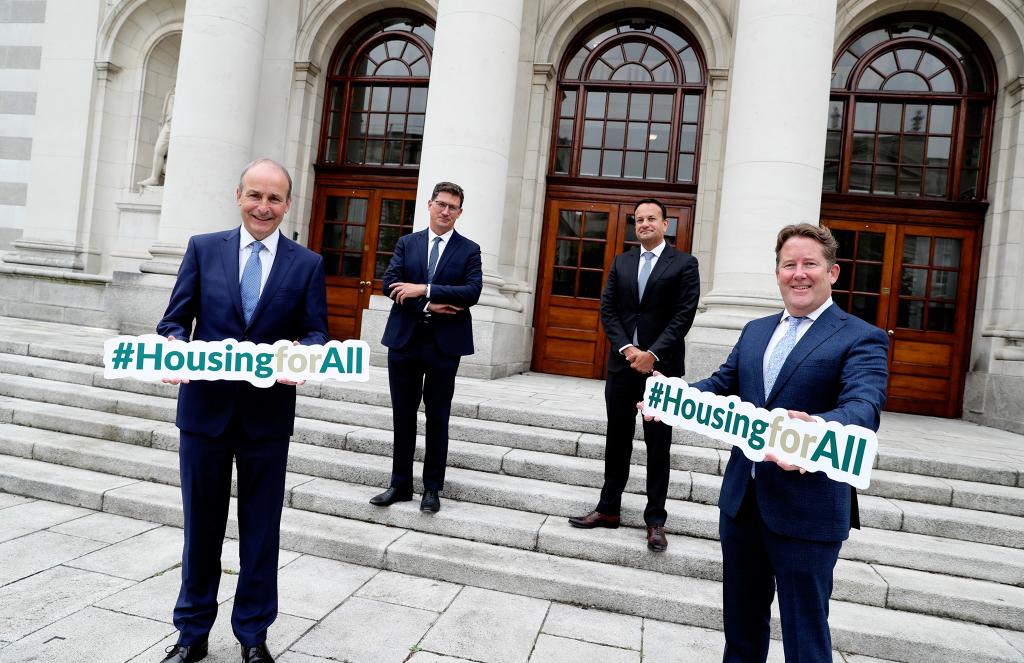Thessaloniki gets ready for its metro launch in November
The underground rapid transit lines have been under construction for almost two decades due to various project delays
 TheMayor.EU logo
TheMayor.EU logo 
Martin, Ryan, Varadkar and Minister for Housing, Local Government and Heritage, Darragh O’Brien (L-R) launching the plan, Source: MerrionStreet on Facebook
The country’s most ambitious housing programme to date addresses a persisting problem – high construction costs leading up to high property prices
The Irish government has launched Housing for All - a New Housing Plan for Ireland. The ambitious programme aims to allow every Irish citizen to be able to purchase or rent a home at an affordable price through an increased supply of social, affordable and private housing over the next decade.
The plan is supported by over EUR 4 billion in guaranteed State funding every year, the highest level of Government investment in building social and affordable housing ever.
The plan also includes measures to ensure that the necessary land, workforce, funding and capacity are available so that the public and private sectors can meet the specified targets.
The plan is based on four pathways, to wit:
These are some of the plan’s main initiatives:
Speaking at the launch of the plan on 2 September, the Taoiseach (Prime Minister) Micheál Martin said, as quoted by MerrionStreet: “Today we are announcing the most ambitious programme of social and affordable housing delivery in the history of the State, with 90,000 social homes and 54,000 affordable homes to be provided by the end of 2030. We will also continue to support our most vulnerable by significantly increasing the number of tenancies for those experiencing homelessness and who have more complex needs. Housing for All will provide the basis for a long-term sustainable housing system for this and future generations.”
Tánaiste (Deputy PM) and Minister for Enterprise, Trade and Employment Leo Varadkar admitted that construction costs are too high in Ireland which ultimately affects the price of homes and damages the economic competitiveness. To overcome the existing challenges, we need to strengthen the residential construction supply chain and modernise construction methods, which the Housing for All plan takes care of, he added.
The Minister for the Environment, Climate, Communications and Transport, Eamon Ryan focused on the environmental sustainability aspect of the government’s planning and housing decisions. “The retrofitting of 36,500 local authority-owned properties and the introduction of minimum BERs for rental properties will help move our existing housing stock to a low-carbon future. This will assist with delivering on our national retrofit targets. Moreover, the focus on the circular economy, waste reduction and keeping materials in use throughout the construction process will reduce resource consumption, while also delivering cost reductions.”
The Minister for Justice, Social Protection, Rural and Community Development, Heather Humphreys, emphasized the plan’s potential in revitalizing rural Ireland. She specifically mentioned the forthcoming Town Centres First policy aimed at regenerating town centres and promoting residential occupancy and the new Croí Conaithe (Towns) Fund initiative of providing serviced sites for housing in small towns and villages.

The underground rapid transit lines have been under construction for almost two decades due to various project delays

Now you can get your wine in Talence by paying directly in Bitcoin

That’s because the state has to spend money on updating the railway infrastructure rather than subsidizing the cost of the popular pass

Rethinking renewable energy sources for the urban landscape

The examples, compiled by Beyond Fossil Fuels, can inform and inspire communities and entrepreneurs that still feel trepidation at the prospect of energy transition

Now you can get your wine in Talence by paying directly in Bitcoin

The 10th European Conference on Sustainable Cities and Towns (ESCT) sets the stage for stronger cooperation between the EU, national and local level to fast track Europe's transition to climate neutrality.

At least, that’s the promise made by the mayor of Paris, Anne Hidalgo

The underground rapid transit lines have been under construction for almost two decades due to various project delays

At least, that’s the promise made by the mayor of Paris, Anne Hidalgo

Hostal de Pinós is located in the geographical centre of the autonomous region

Despite its church-y name, the district has long been known as the hangout spot for the artsy crowds

Urban dwellers across the EU are having a say in making their surroundings friendlier to people and the environment.

Forests in the EU can help green the European construction industry and bolster a continent-wide push for architectural improvements.

Apply by 10 November and do your part for the transformation of European public spaces

An interview with the Mayor of a Polish city that seeks to reinvent itself

An interview with the newly elected ICLEI President and Mayor of Malmö

A conversation with the Mayor of Lisbon about the spirit and dimensions of innovation present in the Portuguese capital














